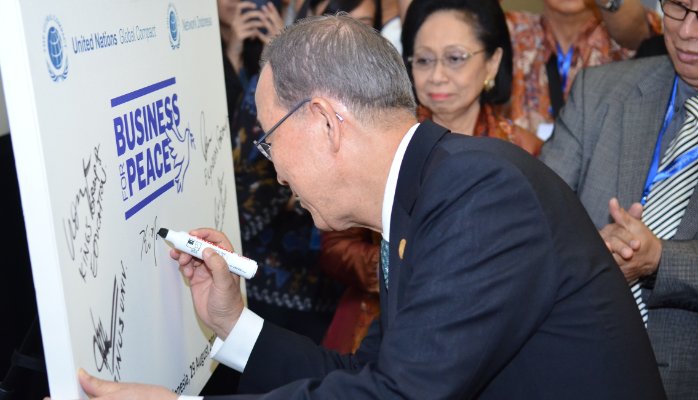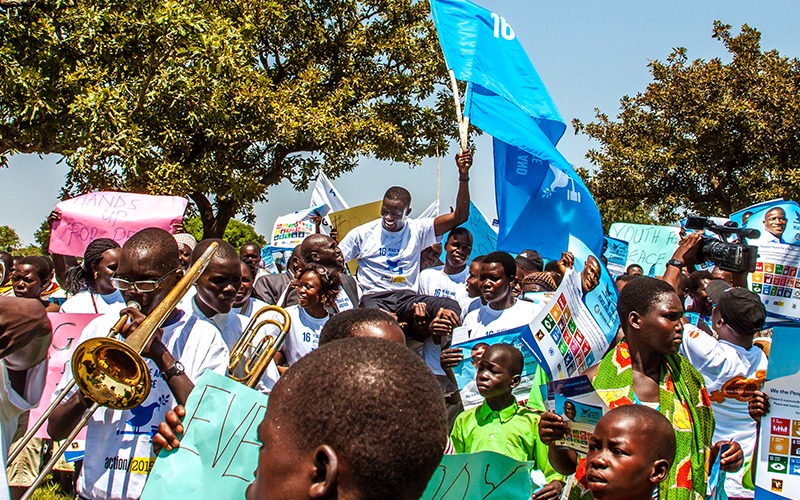Why Businesses Like Ours Have To Be Part Of Creating Peace
Towards the end of last year, I was honoured to be invited to speak on a panel at the Business For Peace Event, held in Bogota. Colombia suffers its share of violence. According to Rodrigo Rivera, the country’s High Commissioner For Peace, nearly 16% of Colombia’s population is affected by conflict.

Columbia – Photo by Milo Miloezger
Business for Peace is a broad and contentious subject, particularly when considering resource-rich countries. I addressed it from the standpoint of my background in CTG, a company that specialises in providing support to humanitarian projects in fragile, conflict-affected and post-disaster areas.
In most cases, peaceful conditions are the ideal for businesses to thrive, fostering trade and industry. The concept that business could and should actively promote peace – as an extension of its social responsibility – is relatively new*; certainly, across the Middle East and Africa, which is where most of CTG’s operations are based.
Whilst there is a plethora of ways the private sector can reduce violence – and I’m only able to share opinions based on experience I’ve gained – on this panel, I focused on one: foreign investment. Some believe that it encourages negative strategies, including bribery and corruption, which can create new conflicts or exacerbate existing tensions. It is also difficult to evidence a direct correlation between investment and reduced violence.
However, if investments are made into businesses with strong corporate social responsibility ideologies, investments can spawn anticorruption activities, improved infrastructure, collaborations on social strategies, and ultimately contribute to increase a country’s gross domestic product (GDP) and aid the construction of a functioning state.

Business for Peace Bogota, Columbia
TURNING WORDS INTO ACTIONS
In order for investments to contribute to peace, however, it is essential that businesses respect the rule of law and abide by international labour and environmental standards.
One key facet of this is tax compliance. Unfortunately, in a lot of countries where CTG operates, revenue being put into the government can be stolen, cash sent offshore, Government officials be seen to be driving around in fancy cars, etc.
This can be somewhat, not totally, alleviated by businesses building relationships with local government institutions and encouraging governments to invest directly into the communities where they operate. To take actions like rewarding peaceful behaviour, by initiating work in the most stable villages with the idea that local communities will hold saboteurs accountable for delayed development, thus hopefully fostering peace. Although, wholeheartedly, I agree that this is not an easy undertaking.

Business for Peace Columbia
Domestic microenterprises and international and national SMEs may have the greatest potential to foster peace given their proximity and connection to local networks. There are two ways that CTG does this: we insist on community engagement through our grass root networks and we insist on using local suppliers that are ethical and ideally would like all of our suppliers to adhere to 10 principles of the United Nations Global Compact. We also have a strong focus on driving gender equality and are always on the lookout for women-owned businesses to be our suppliers and sub-contractors.
“For me, the main argument in Business for Peace may not be that business should promote peace, but that ethical businesses are already contributing to creating peaceful societies.”
A strong example of the way we operate, is a recent food distribution programme that CTG ran in Somalia. We hired local people from local communities and vetted them through the clan leaders, AMISOM, and other local government entities. This ensured that we would have safe passage through certain areas and that there would be no resulting clan rivalries. Another example is a peace and reintegration programme that our staff enabled in Afghanistan – in the early days of the project 8000 weapons had been removed and 1100 insurgents had been rehabilitated, including 50 Taliban leaders. The smooth running of the project was in part thanks to how CTG empowered the right people and had strict processes in place to tackle corruption.
For me, the main argument in Business for Peace may not be that business should promote peace, but that ethical businesses are already contributing to peace in very real terms.

Business for Peace Bogota, Columbia
CHOOSE YOUR PARTNERS WISELY
I would also say that it is important for businesses who have proven themselves, with a reputable record in conflict-affected and fragile settings to continue with the work they are doing, because the alternative would be opening the door to unethical businesses who purposefully deviate from responsible practice, which may have the impact of fostering conflict.
The way that companies do business is key – when companies are not tax compliant, are not adhering to acceptable living wages and are demanding kickbacks (sex for jobs for example) this is only making troubled areas even more so. CTG insists on ethical business dealings and has a robust whistleblowing policy to empower our staff.
We need to drive donors and the public sector to hold businesses accountable and to make ethical business behaviour the only acceptable way. A simple way of doing this would be to only consider service providers that have signed up to the UN Global Compact and publicly committed themselves to the ten principles. Should this be a mandatory requirement when tendering to contracts for humanitarian aid and development projects? I think this would be a real commitment to Business For Peace.
Sign up and join the UN Global Compact Business For Peace.

Nobel Peace Prize nominee Victor Ochen, raised a flag to represent Goal 16, Peace and Justice Strong Institutions, at the Barlonyo Massacre Burial Site in Northern Uganda, to support the UN Global Goals for Sustainable Development.
CTG were the proud winners of the UAE Sustainable Development Goal (SDG) Pioneer for Peace Award for 2017 – the SDG Pioneers campaign recognises those who do an outstanding job of taking action on sustainable development issues and was awarded to CTG by the United Nations Global Compact (UNGC) local network representative in the UAE.
* https://probonoaustralia.com.au/news/2014/12/the-role-of-business-in-enhancing-peace-and-reducing-violence/
MORE ABOUT CTG ON PEACE
Anisa Dirie, Somalia
Human Resources Manager
